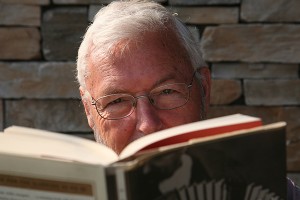Home »

A book more about Hemingway than Africa
Book Review
By Derryll White
Hemingway, Ernest (1935). Green Hills of Africa.
 People may think ‘Why are you reading something almost 80 years old?’ Well, I grew up with Ernest Hemingway and Tom Wolfe and D.H. Lawrence, and from time-to-time I go back just to check on things and measure my sense of good writing now against what I remember.
People may think ‘Why are you reading something almost 80 years old?’ Well, I grew up with Ernest Hemingway and Tom Wolfe and D.H. Lawrence, and from time-to-time I go back just to check on things and measure my sense of good writing now against what I remember.
I remember Hemingway as the great white hunter, a man’s man who had to fight and drink under all challengers. I remember him as an under-the-table war correspondent with a bit of a sensitive side, and someone who hung out with people I was really interested in such as Gertrude Stein and Ezra Pound.
In 1935 Hemingway and Pauline, his wife, headed to the great Serengeti Plain of Africa on a two-month safari. He says in the forward that none of the characters in this novel are fictitious. He has attempted to “write an absolutely true book to see whether the shape of a country and the pattern of a month’s action can, if truly presented, compete with a work of the imagination.”
Some of my old memories of Hemingway surfaced early in the reading of this novel. He resists limits, does not like boundaries imposed on him, and is incredibly competitive. He thinks of himself as a loner, outside the norm following his baser instincts. The one thing about Hemingway that has always attracted me, and it comes through clearly here, is that he writes so he can live. He writes to get well. He also has the attitude which states that ultimately what is important is the presence, or lack thereof, of ‘politics, women, drink, money and ambition.’
It is interesting to read Hemingway commenting in 1935 on the tribal scarring, tattooing and piercing of the Wakamba. And regretting that he had none himself except for some informal scars and puffy welts. Hemingway should be alive today to observe the huge transference of culture that has taken place.
This is a book more about Ernest Hemingway than about Africa. Perhaps that is the way all good works are, a platform of reality for the exploration of something else that is more hidden, more personal. Hemingway had demons that the possibility – the size and scope of – Africa shrank and made manageable. As he says, “I had loved country all my life; the country was always better than the people.”
I worked hard throughout the reading of this novel to try and determine what Hemingway was really about. He obviously enjoyed the killing. I hunted much of my life and enjoyed it immensely – the focus to get me out into the lonesome country, alone or with a partner. I always hunted meat, never trophies, so perhaps that is one of the things I don’t understand. Hemingway always wanted bigger – the biggest; what, I don’t know. Maybe it comes down to penis size. He wanted the biggest and I am comfortable with what I got – not big, but killing or talking about it doesn’t make it bigger.
Don’t get me wrong, there are moments of fine writing in ‘Green Hills of Africa.’ I just don’t, in the end, get what Hemingway is after. He wounds a buffalo, kills another, and walks away happy. In the Kootenays we know that if you wound a grizzly you finish it. It doesn’t matter how remote you don’t leave it for someone else to stumble on, no matter how scared you are. Maybe that’s it, I just don’t understand him as a man and he writes to BE a man.
Hemingway is smart enough to see America as a user, even in 1935. And he vehemently sees himself as an American. Towards the end of this book he laments the way the foreigner cuts down the trees, brings machinery in and destroys the land. And somehow he thinks he is removed from that because he is a writer and a hunter. In the end, however, he is so full of himself that I do not believe he ever really sees the natives as people or the land as beautiful. It is there simply to provide for him.
All said and done, I am glad I revisited this work. It is definitely not as good as I remembered, but I will read more Hemingway.
“I’d like to write something about the country and the animals and what it’s like to someone who knows nothing about it.” – Ernest Hemingway
********
SERENGETI – It was a green, pleasant country, with hills below the forest that grew thick on the side of a mountain, and it was cut by the valleys of several water courses that came down out of the thick timber on the mountain. Fingers of the forest came down onto the heads of some of the slopes and it was there, at the forest edge, that we watched for rhino to come out.
WRITING – …I thought about Tolstoi and about what a great advantage an experience of war was to a writer. It was one of the major subjects and certainly one of the hardest to write truly of and those writers who had not seen it were always very jealous and tried to make it seem unimportant, or abnormal, or a disease as a subject while, really, it was just something quite irreplaceable that they had missed.
LOVE – …I loved the country so that I was happy as you are after you have been with a woman that you really love, when, empty, you feel it welling up again and there it is and you can never have it all and yet what there is, now, you can have, and you want more and more, to have, and be, and live in, to possess now again for always, for that long, sudden-ended always; making time stand still, sometimes so very still that afterwards you wait to hear it move, and it is slow in starting. But you are not alone, because if you have ever really loved her happy and untragic, she loves you always; no matter whom she loves nor where she goes she loves you more.
NOT A ROMANTIC – Droopy’s country, when we reached it that evening, after a hot ride through red-soiled bush-scrubby hills, looked awful. It was at the edge of a belt where all the trees had been girdled to kill the tse-tse flies. And across from camp was a dusty, dirty native village. The soil was red and eroded and seemed to be blowing away and camp was pitched in a high wind under the sketchy shade of some dead trees on a hillside overlooking a little stream and the mud village beyond.
KILLING – I did not mind killing anything, any animal, if I killed it cleanly, they all had to die and my interference with the nightly and the seasonal killing that went on all the time was very minute and I had no guilty feeling at all.
AFRICA – A white hunter worked three months out of the year and drank for 12 and the Government was ruining the country for the benefit of the Hindu and the natives. That was what they told you, sure. But I did not want to make money. All I wanted to do was live in it and have time to hunt.
 – Derryll White once wrote books but now chooses to read and write about them. When not reading he writes history for the web at www.basininstitute.org.
– Derryll White once wrote books but now chooses to read and write about them. When not reading he writes history for the web at www.basininstitute.org.







